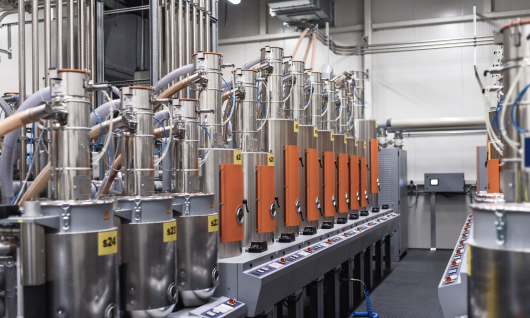Highlights

A Smart Manufacturing Execution System (MES) that supports every activity across the production lifecycle
By digitizing the entire process—from raw material input to processing, assembly, inspection, and shipment—the system enables objective, real-time production management. Resource allocation and status tracking are performed based on the specific characteristics of each raw material, allowing for precise control and optimization of manufacturing operations. Production units are distributed efficiently to prevent bottlenecks and maintain seamless workflows across processes. The system also facilitates immediate detection, analysis, and resolution of issues, driving continuous optimization of the production environment.
Maximizing Efficiency Through Data Standardization
Data standardization enhances operational efficiency by improving data management and service architecture, ultimately helping to reduce costs in the manufacturing industry. On the data management side, the use of a centralized Data Dictionary supports compliance with various data standards—such as terminology, nomenclature, and domain-specific definitions—across manufacturing environments. This approach significantly reduces the cost and effort required to manage diverse datasets. From a service architecture perspective, adopting a Microservices Architecture (MSA) enables horizontal scaling and allows independent deployment of modular services. This facilitates rapid and continuous service improvements while optimizing the use of operational resources.
Rapid Anomaly Detection Through Statistical Analysis
The system provides rapid anomaly detection capabilities by leveraging statistical analysis based on real-time process data collection and centralized management of specifications and rules. A robust monitoring and detection framework is established for each process, enabling timely identification of deviations. Process indicator analysis is performed using collected data to identify CTQ (Critical to Quality) and CTP (Critical to Process) parameters. These key parameters are visualized through charts and dashboards, while push notifications deliver real-time alerts to users when anomalies occur—enabling immediate recognition and swift response to issues on the shop floor.
Features

Advanced Manufacturing Execution System (MES) services serve as a critical enabler for optimizing and managing production processes in the manufacturing industry. By orchestrating resource allocation, task prioritization, and production unit distribution, these services enhance operational efficiency. Real-time monitoring of each process, combined with centralized data management, ensures seamless visibility and control across the entire production line. Comprehensive visualization tools offer clear insights into key performance indicators (KPIs), enabling data-driven decision-making and efficient process management. As a result, manufacturers can improve productivity and strengthen their competitive edge in an increasingly demanding market.

Real-time data collection via a Manufacturing Execution System (MES) significantly improves inventory control and production process efficiency. By automating raw material input and inventory management, MES minimizes discrepancies between physical stock and system records. It also enables material consumption tracking and lot traceability across process steps, streamlining operations such as order fulfillment, material handling, quality assurance, and delivery management. All production stages are managed within a single, integrated system, ensuring comprehensive oversight and consistent quality control throughout the manufacturing process. These capabilities empower manufacturers to boost productivity and achieve more efficient, end-to-end operational management.

A statistics-based anomaly detection system plays a critical role in the manufacturing sector by analyzing real-time data to ensure quality and process safety. Collected data is transformed into key indicators such as trends, variations, and averages, which serve as the foundation for setting specifications based on system, regulatory, or engineering requirements. The system enables predefined responses to out-of-spec values and supports ongoing process improvement through analysis of process capability indices such as CPK and PPK. User-friendly interfaces allow for automatic parameter generation, rapid identification of outliers, and early detection of high-risk scenarios. With integrated dashboards and push notification alerts, operators are empowered to respond quickly and effectively to any deviations.